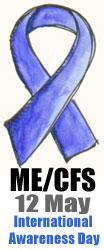
It's obviously that time of year... A few days ago someone came to visit this blog searching for stomping snails, and today it was chucking slugs. These creatures do seem to bring out the violent worst in gardeners! I've seen quite a lot of slugs in the back yard, so I guess it's time to bring on the nematodes. Sadly this week has got away with me, so it'll have to be next week now.
My Father is still in hospital, but they want to discharge him. We are going for a Case Conference on Tuesday afternoon. I have been trying to find out about continuing NHS care. Seems I will have to write to the strategic health authority to get a copy of the the local eligibility criteria. I hope they are a bit more helpful than the hospital concerned. Getting any information out of them is like getting blood out of a stone.
I wrote on 4th April (and it was hand delivered to the ward on that date) requesting the medical assessment for Dad's discharge. Yesterday I received a letter from the Operational Management Directorate which said "We note that you have requested information regarding your father's discharge and the Ward Manager has confirmed that you have now been given that information."
This is news to me. We haven't received ANY information. My mother had a letter some weeks ago (April 3rd), but apparently it was just a pro-forma with no details. I was very angry about it at the time, Mum is in her 80s and has age related macular degeneration, so it seems a bit pointless writing to her. I know Mum wants Dad to go back home to her, but I don't think it will be feasible unless they can arrange more or less round-the-clock care. Which seems highly unlikely.
Hospital discharge is supposed to be a process that involves the patient, their carers, and relatives. I can't say I've noticed much in the way of involvement of either Mum (Dad's primary carer), myself or John (my husband, who does his best to give some care for Mum and Dad additional to that provided by Social Services since I can't). Other than that John (at work) and I (at home) get phone calls from social workers who can't get through to Mum, probably because they call when she's out visiting Dad in the hospital.
This is what is supposed to happen according to a very helpful document from the Alzheimer's Society.
Assessment for hospital discharge
Before a person is discharged, their needs must be assessed so that any support or care services that they need can be arranged before the person leaves hospital. Any organisations that will be providing these services must be made aware of when the person is due to be discharged and when they should be visited.
If the patient’s needs have changed considerably since they were admitted to hospital, they may require a multidisciplinary assessment. This might involve the person’s consultant, nursing and ward staff, local authority staff, the person’s GP and their carer. If the patient’s needs have not changed considerably they may need a simpler assessment.
At the time of the assessment the person with dementia, their carer and/or their relatives are entitled to written information that explains:
* The health authority’s eligibility criteria for NHS continuing care
* The services that the primary care trust and the NHS trust will provide
* The services that the local authority will provide, including the likely cost of these and any welfare benefits that the person or their carer may be able to claim to help pay for them
* The NHS trust’s and local authority’s complaints procedure.
So Mum/I/John should have been sent or given various documents a while ago "at the time of the assessment". The assessment was apparently completed on April 4th, but only reached Dad's Social Worker on 17th April (probably typed up in India?). Nothing in today's post, will give it till tomorrow. Next move will probably be a phone call to PALS (Patient Advice and Liaison Services).
I am concerned that we had a very "heavy" warning from Dad's first consultant that he has something nasty in his lungs (we haven't yet managed to find out what) and that we MUST be very careful to use the alcohol wash after visiting. I hasten to add that we always did that anyway - I have worked in a bacteriology lab, admittedly many years ago. Even back in the 60s some people were concerned with emerging bacterial resistance.
John asked last week if Dad had been re-tested for this "organism that has colonised his lungs" (as the consultant put it). I was rather shocked by the response, which was along the lines of "Oh we've treated that so it's gone, we don't bother re-testing". Surely this can't be right? When we saw the first consultant he seemed to me to be saying that the infection wouldn't clear completely, and pneumonia would continue to be a danger.
I think I've blogged long enough on the worrying scary stuff for now. So here's some good news!
We make a big deal of the Grand National these days. Choose horses, lay bets, try and memorise the colours of the silks, and so on. And open a bottle of Fizz just before the race starts. I had £1 each way on five horses. John only bet on three. I couldn't keep track of which horse was where, and who had fallen, but towards the end it appeared at least two of my horses were still running.
And one of them won! And the other came third. So thanks to Silver Birch and Slim Pickings I am £52.50 better off than I would have been otherwise.
Tonight's sunset
Showing posts with label nhs. Show all posts
Showing posts with label nhs. Show all posts
Thursday, April 19, 2007
Slugs and snails and other tales...
Posted by
Maggie
at
8:47 pm
2
comments
![]()
![]()
Friday, November 10, 2006
NICE is nasty, and NHS plus is too
NICE is in the process of writing Guidelines on ME. These are likely to impact on the way patients are treated for years to come. And if they are accepted as they stand they will have extremely negative affects on the majority of ME/CFS patients.
Chronic fatigue syndrome /Myalgic encephalomyelitis (CFS/ME) guideline consultation)
"A clinical practice guideline on chronic fatigue syndrome/myalgic encephalomyelitis (CFS/ME) is being developed for use in the NHS in England and Wales. Registered stakeholders for the chronic fatigue syndrome / myalgic encephalomyelitis (CFS/ME) guideline are invited to comment on the provisional recommendations via this website."
"Note that the provisional recommendations presented here do not constitute the Institute's formal guidance on this topic. The recommendations are provisional and may change after consultation."
Consultation dates: 29th September - 24th November 2006
The full version (Maggie's comment - 269 pages!!!) describes the evidence and views that have been considered, and sets out the provisional recommendations that have been developed.
The (NICE) short version (Maggie's comment - 48 pages) presents the provisional recommendations only with some brief supporting information.
The ME Association's response to this is better than anything I could try to put together.
=========================================================
Break for something positive! ;-) Had a wonderful sunset yesterday evening.
=========================================================
The NHS is already providing guidance to employers. NHS Plus have gone ahead and published advice for employers, health care professionals and pre-empted the NICE Guidelines. This page gives links to the various PDFs.
These are:
Occupational Aspects of the Management of Chronic Fatigue Syndrome: a National Guideline (64 pages)
Occupational aspects of the management of chronic fatigue syndrome: evidence-based guidance for employers (8 pages)
Occupational aspects of the management of chronic fatigue syndrome: evidence-based guidance for healthcare professionals (12 pages)
Occupational aspects of the management of chronic fatigue syndrome: evidence-based guidance for employees (8 pages)
I am particularly concerned to read this in the booklet for employers:
"Is ill-health retirement an option?
Ill-health retirement is a possible
outcome although it should only be
considered if appropriate treatments
(such as CBT or GET) have been
explored. Where other conditions such
as depression or anxiety are present, they
should be treated." (page 6)
I would imagine that anyone who is ill enough to seek ill-health retirement would be at the more severe end of the scale, so CBT or GE would surely be inappropriate for these people? Even if they were not too badly affected (though bad enough not to be able to work) there must be a danger for a high percentage (almost certainly over 50%) of moving from moderately to severely affected. I am reminded of Catch 22.
The booklet for employees says this:
"Could I take ill-health retirement?
This is not a first choice. It is always
better to try some of the things discussed
above first. Research shows that most
people feel better about themselves if
they can work. If you have had your
illness for some time, you may come
under the Disability Discrimination Act
1995. This Act requires your employer
to make reasonable adaptations to your
work in accordance with your disability.
CBT and GET increase the likelihood of
people with CFS returning to work.
While these treatments may not be
suitable for everyone, you should explore
them before considering ill-health
retirement." (page 7)
I guess it all depends on how you interpret the word "explore". I bet most insurance companies would interpret it as "compel", also many employers.
As for the booklet for healthcare professionals, it makes my blood boil!
Under "What Causes CFS?" (page 4)
The perpetuation of CFS may be attributed to an individual’s response to an illness. Factors may include:
• inactivity, deconditioning, weakness and fatigue brought on by excessive rest after an acute viral illness
• inappropriate avoidance of activity as a coping mechanism leading to further deconditioning
• personal or work conflicts and fears about the condition itself.
(page 5)
"MANAGEMENT – A BIOPSYCHOSOCIAL APPROACH
Interventions should aim to address not just the biological aspects of CFS but also the various psychological, social and occupational factors that may delay the recovery process. There are currently two interventions supported by good quality evidence; a third is the subject of a large randomised controlled trial (RCT)."
"Not everyone responds well to CBT, however, and a number of factors may limit its effectiveness. These include poor social and work functioning before becoming ill; low sense of control over the CFS symptoms; passive activity patterns; excessive focus on bodily symptoms; and taking medical retirement or disability-related
benefit during the treatment." (page 6)
(page 8)
ADVISING PATIENTS
Patients who are still working should be advised to stay at work, even if they feel tired. Time off work is likely to exacerbate the symptoms and make recovery more difficult. Those returning to work should discuss with their employer – and preferably with an occupational health professional in consultation with their GP or other treating practitioner – how to build up their working hours and workload over time. Patients should be advised against seeking early medical retirement, at least until all rehabilitation strategies have been explored. [D]
[D] Evidence from non-analytical studies or expert opinion.
I haven't had time to read the full NHS Plus guidelines yet. But the Guideline Development Group (pages 7 & 8 of the PDF) contains many of what PWME (People with ME) would regard as "the Usual Suspects":
Guideline leader
Dr Karen Pratt
Specialist Registrar in Occupational Medicine,
BUPA Wellness, London
Director of NHS Plus evidence-based guideline project
Dr Ira Madan
Consultant Occupational Physician,
Guy’s and St Thomas’ NHS (Foundation) Trust, London
External assessors
Professor Michael Sharpe
Professor of Psychological Medicine and Symptoms Research,
School of Molecular and Clinical Medicine,
University of Edinburgh
Professor Peter White
Professor of Psychological Medicine,
Wolfson Institute of Preventative Medicine
(School of Medicine and Dentistry),
Queen Mary’s University of London
Guideline Development Group members
Dr William Bruce-Jones
General Adult and Liaison Psychiatrist,
Avon and WiltshireMental Health Partnership NHS Trust
Nikie Catchpool
Occupational Advanced Practitioner Therapist,
Bath and Wiltshire CFS/ME Service,
Royal National Hospital for Rheumatic Diseases NHS Foundation Trust, Bath
Professor Trudie Chalder
Professor of Cognitive Behavioural Psychotherapy,
Institute of Psychiatry, at the Maudsley,
King’s College, London
Chris Clark
Chief Executive, Action for ME (until March 2006),
AfME,
3rd Floor, Canningford House,
38 Victoria Street, Bristol BS1 6BY
Sharon Hynes
Head of Human Resources and Training,
BUPA Wellness, London
Dr Meirion Llewelyn
Consultant Physician,
Infectious Diseases/General Medicine,
Royal Gwent Hospital, Newport, Gwent
Dr Jon Poole
Consultant Occupational Physician,
Dudley NHS Primary Care Trust,
Dudley, West Midlands
Suzanne Roche
Research Assistant,
South London and Maudsley NHS Trust, London
Gael Somerville
Occupational Health Nurse,
British Broadcasting Corporation, London
Bella Stensnas
Research Assistant,
South London and Maudsley NHS Trust, London
Conflicts of interest: none declared.
I do not understand why a private health insurance company's employee should be the "Guidelines Leader" for NHS Guidelines. And to say they have no conflict of interest is laughable. I guess Prof Simon Wessely is too bound up in dissing victims of World WarI to be bothered with this stuff any more.
And Dr Crippen, have you heard of an "Occupational Advanced Practitioner Therapist" before? Another to add to your lists? ;-)
Posted by
Maggie
at
5:14 pm
2
comments
![]()
![]()
Labels: biopsychosocial, CBT, chronic fatigue syndrome, employers, Graded Exercise, guidance, ill health retirement, ME/CFS, myalgic encephalomyelits, nhs, NICE, occupational, plus, sunset, Wessely, WWI
Subscribe to:
Posts (Atom)




